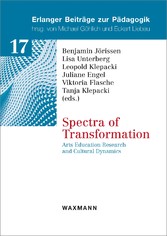Suchen und Finden
Service
Book Cover
1
Imprint
4
Contents
5
Preface
7
Processes of Cultural Tradition and Transformation from an Educational Science Perspective (Leopold Klepacki & Tanja Klepacki)
11
Spectra and Dynamics of Social and Cultural Transformation. Transformations of Contemporary Culture, Work and Power (Hannelore Bublitz)
19
1. Introduction: Transformations of society and the individual
19
2. The contingency culture of modernity
21
3. The “physiognomy of the public space” and its structural transformations (Habermas 1968)
23
4. Post-disciplinary feudalism – the transformation of visibility structures
24
5. Conclusion
26
References
27
Digital Cultural Education. The capability of Cultural Education facing digital transformation (Benjamin Jörissen & Lisa Unterberg)
31
1. Introduction
31
2. “Cultural Education” as a practice of reflecting on culture through culture
31
3. Cultural education between certainty and indeterminacy
32
4. Challenges of Digital Cultural Education
34
5. Capability of Digital Cultural Education
35
References
36
Space for Visions: Urban Life as Movement (Marc Hill)
39
1. Talk about parallel societies
40
2. Informal learning in urban life
41
3. On the experience of urban life
46
References
48
The Alchemies of the Arts in Education. Problematizing some of the Ingredients of the Recipe (Catarina S. Martins)
51
1. Introduction
51
2. The moral and civilizing arguments: practices and devices of government and the arts
52
3. Museums as civilizing machines
54
4. Schools as civilizing machines
57
5. Are the arts in school about the arts?: the alchemies of the arts travelling into education
60
6. Can we think otherwise?
63
References
65
Studying Arts Education Policy and Governance. Concepts and Perspectives (Teunis IJdens)
69
1. Introduction
69
2. Objects and concepts
69
3. Transformation
71
4. Comparative policy research
76
5. Global governance
79
6. Instead of a conclusion
82
References
83
Plot. A Space for Transformation in the Intercultural Research Process (Tuula Jääskeläinen)
89
1. Initiation: The Gambia Project
89
2. Complication: Plot
91
3. Resolution: Transformation
92
References
93
Blurred affiliations. Transformation between fields of art, science and humanities: cases of artistic research and arts-based research (Zofia Ma?kowicz)
95
1. Introduction
95
2. “Science”: translational problems and academic division
95
3. Blurred territories and complicated relationships between science, art and the capitalist market
96
4. Contemporary art: inherent characteristics, new territories of interest and knowledge production
97
5. Artistic research: a call for visibility?
98
6. Arts-based research: dissolving the objectivist model of cognition
99
7. Conclusion
100
References
100
The Spectra of Post-digital Transformation. Tracing The Haptic Field – a Protocol of Facing Error,Dysfunction and Noise (Anna-Carolin Weber)
103
1. Introduction
103
1.1 Digitalization in Everyday Life
103
1.2 Digitalization and the Arts
104
1.3 Tracing Errors – Digitalization and Cultural Education
104
2. My approach: Tracing The Haptic Field
105
2.1 Protocol of a Visit to The Haptic Field
106
3. Wrap Up and Future Prospect
107
References
109
Transformation of Museums. What happens if the exhibits are digital objects? (Martha Karoline Schröder)
111
1. Introduction
111
2. Museum – exhibition – exhibits
111
3. Digitalization and its impact on the museum
112
4. Example: Asteroids
113
5. Conclusion
115
References
115
Inclusive Museum Strategies that Make a Difference. From Easy-to-Read to Learning German at the Museum (Luise Reitstätter)
117
1. Tell Me about Salzburg! – Retelling History Through Contrasting Stories and Different Language Styles
118
2. Use and Discourse – From Disregarding to Appreciating Easy-to-Read Texts
119
3. Use and Value – Combining Linguistic and Cultural Learning at the Museum
120
4. Making a Difference – On Power Structures and Moments of Transformation
121
References
122
The transformational dynamics of orchestras in the 21st century. The new socio-educational functions of symphonic orchestras (Esther Ropón Mesa)
125
1. Introduction
125
2. The orchestra as a social model
125
3. Classical music facing the challenge of finding new audiences
126
4. Artistic education and symphony orchestras
127
5. Objectives and challenges of orchestras in Spain
128
6. Conclusion
130
References
130
From Artist to Pedagogue? The Idea of Transformation in the Course of a Qualification Program for Vocal Artists (Vanessa Friedberger)
133
1. Introduction: Transformation in the course of pedagogical qualification for vocal artists
133
2. The “Music-Voice-Speech” project and its evaluation approach
134
3. The artists’ motives between art, education and (music-) therapy
135
4. Conclusion: The relevance of transformation
136
References
137
Community Houses. Modern Cultural and Political Public Space in Estonia (Egge Kulbok-Lattik)
139
1. Introduction
139
2. Becoming “Cultured”
140
2.1 Political Nature of the Cultural Sphere
142
2.2 Life-Long Informal Educational System as Part of the National System of Innovation
143
3. Estonian Community Houses in Transformation
143
Conclusion
148
References
148
Arts Education and Transformations. Challenges for Sensitised Perspectives and Methodological Further Developments (Fabian Hofmann & Sarah Kuschel)
151
Introductory remarks by the authors
151
1. The Netzwerk Forschung Kulturelle Bildung
152
2. The taking of critical and sensitive perspectives
153
2.1 Arts education between empowerment and othering
154
2.2 Impacts of arts education from a discourse-analytical point of view
154
2.3 Diversity as a topic of further education
155
3. The transformation of the methodology of the research on arts education
155
3.1 From educational theory to empirical research, from “promises” to “evidence”
155
3.2 Educational theory or empirical research?
156
3.3 From education to impact?
156
3.4 On the necessity of a methodological discourse in arts education
158
3.4.1 Problem fields at the epistemic level
159
3.4.2 Problem fields at the methodological level
160
3.5 Dealing methodologically with interaction in the context of arts education – a currently running project of the Netzwerk Forschung Kulturelle Bildung
160
Conclusion
162
References
162
The authors
165
Alle Preise verstehen sich inklusive der gesetzlichen MwSt.








